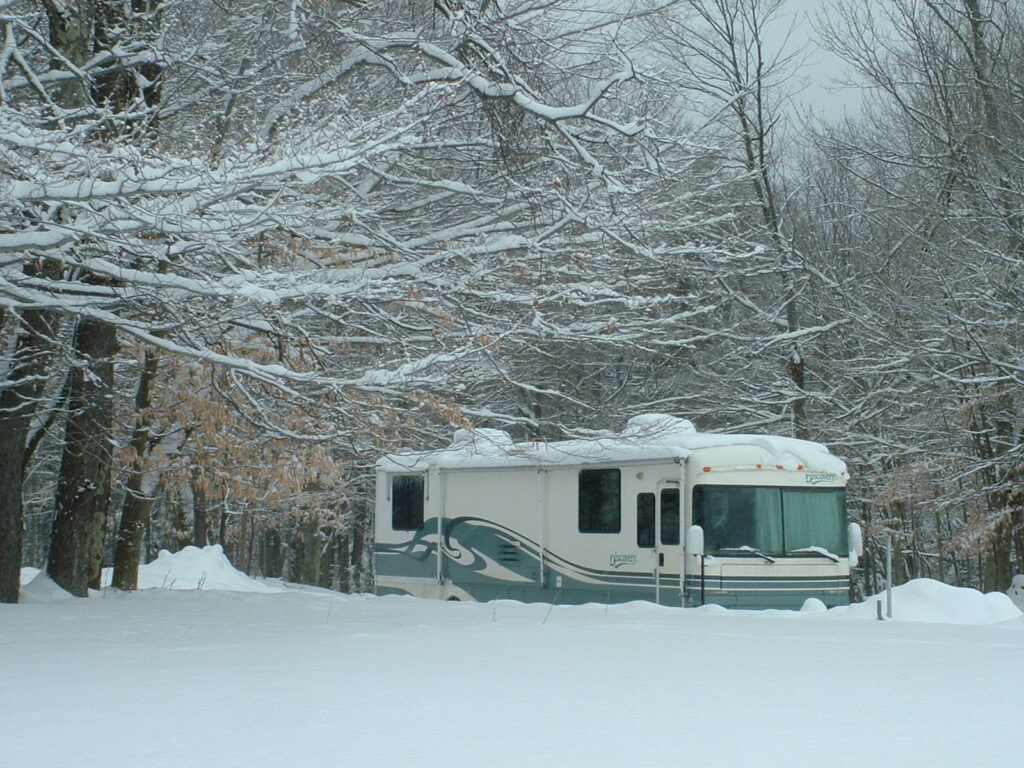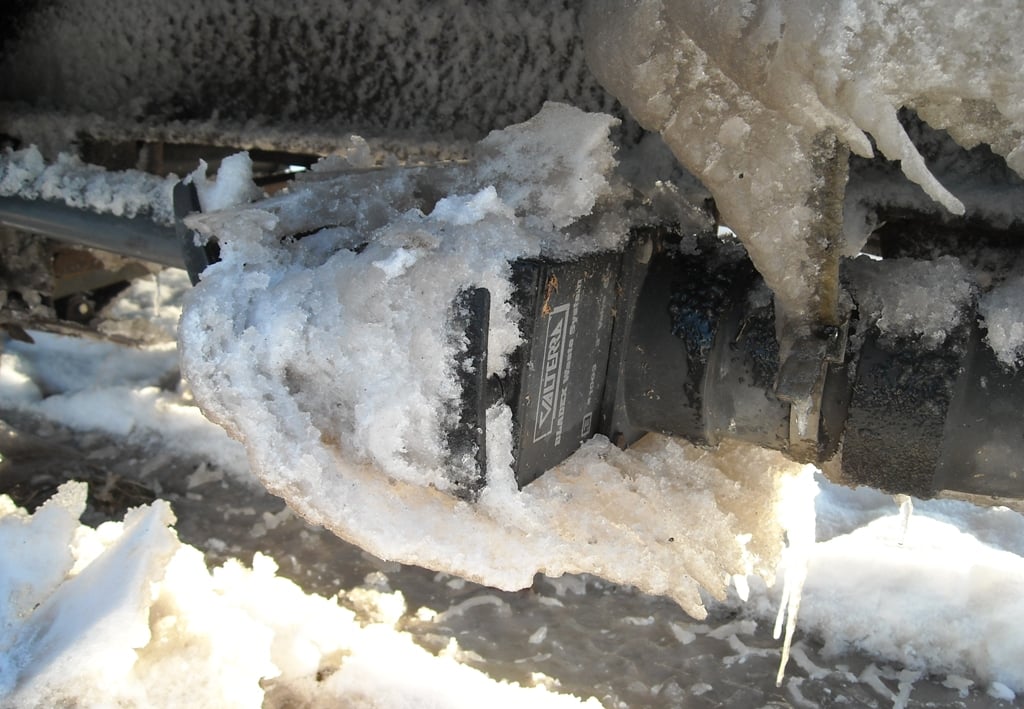
Keep your plumbing from freezing when winter camping. Photo via iRV2 Forums
How To Keep Your RV Plumbing From Freezing When Winter Camping
In previous posts, I have touted the joys of winter camping and all the fun family winter activities that can be enjoyed in an RV. Now, if you choose to take up winter camping and your travels will take you to areas with sub-freezing weather, there are several precautions you should be aware of.
The number one concern is keeping your RV plumbing from freezing. Not just the freshwater system, but the waste holding tanks too.
If you are new to sub-freezing camping, I suggest your first outing be at a campground that has electrical hookups. Having access to shore power provides plenty of energy to keep everything warm, the furnace running, and removes the concern for keeping the batteries charged, which is a whole other entry.
The first step is to keep your RV from freezing on the way to your winter wonderland. If you are comfortable running with your LP turned on, the easiest solution is to leave your furnace on low.
If you are not comfortable running with your LP turned on, you will probably want to leave your RV winterized until you reach camp and take on water upon reaching the campground.

Iced-over termination cap and dump valves.
How to keep RV plumbing from freezing
- Unless you have a heated freshwater hose, fill your freshwater tank upon arriving, then drain and store the hose. Nothing takes the fun out of winter camping more than trying to coil a 25-foot water hose that is frozen stiff. (Note: If your freshwater tank is not heated and you are concerned it might freeze over the course of your campout, leave enough room for expansion in the event the water freezes as to not split your water tank open).
- If you have an exterior shower, remove the showerhead from the hose and make sure it is drained. While the hose and nylon faucet can typically withstand freezing, the shower head is the most susceptible to damage from freezing. If the back of your exterior shower opens up into an interior RV cabinet, like under the bathroom sink, leave the cabinet door open to protect the lines to the faucet and provide some heat to the back of the faucet itself.
- If you have electric hookups, consider taking an electric heater with you to save propane and furnace time. For safety, buy a portable electric heater or an oil-filled electric heater (that shuts off if it tips over). I carry an oil-filled heater as there is no fan to make noise to keep me awake at night.
- Know where your freshwater pipes are located. If they are located in the back of your cabinets, leave the cabinet doors cracked so heat can circulate to them. If they are located in the floor along the heating ducts, make sure your furnace cycles occasionally to prevent them from freezing.
- Keep your holding tanks and valves from freezing by adding RV antifreeze to the tanks. The amount you will need to add will be proportional to the contents in each tank. Also, if your travels to and from the campground will be through winter conditions, be aware that ice can build up on your dump valves and termination cap, which makes for an interesting proposition when you go to dump your tanks.
Subfreezing camping and the precautions and trials that come with it is just another adventure in RVing. Get out there and enjoy! For more tips, check out our post on How To Avoid Winter Camping Problems In Your RV.

I have never had a problem with my valves freezing up or had heat pads on holding tanks in the past with my old motor home. On this new motor home I did have heat pads added on all three holding tanks. Nice to have to be safe from freezing and not a real big expense.
They turn on when it gets cold and off when it gets warm. They come with on / off switch for each pad in summer and when not camping.
My concern is . . . Will the heaters on the tanks keeping the water from freezing also keep both the pipes from the tanks and the valves at the ends of these pipes from freezing also. Do they make a 12 volt heat tape that can be used for the 2 or 3 feet for this short distance of pipe?
Anyone know if these heat pads work that well or about using heat tape let us know.
Thanks for your insight.
The heat pad tank manufacturer also sells heat pads for pipes. Here is the corresponding link to buy them on Amazon: https://www.amazon.com/gp/product/B075JFVBNW/ref=ppx_yo_dt_b_search_asin_title?ie=UTF8&psc=1
An excellent article that addresses one of the many travesties of the RV industry: failure to produce an all season product, which necessitates decommissioning your RV investment for 1/4 to 1/3 of the year. The solution is to avoid all products that are not certified all season. This proscription will naturally target, stronger, better insulated more durable products.
Our water pump is under the shower and heat was unable to reach that area and the water line froze but did not burst. Cut a hole in the access panel, attached a vent allowing warm air to that space.
We spend much time in the Engadin in Switzerland. temperatures often range between -15–30C° in winter, which means everything freezes solid (quickly). Our freshwater and waste water lines are insulated and have been equipped with electric heating , some are 12v, one is an outdoor 230v. line typically needed for water pipes supplying cattle outside with drinking water. One of our water tanks has an additional heating band (about 15″ long). They are all designed to maintain a temperature of 3C”, switching off when necessary. They are not expensive and fitting is straightforward.
The tip about keeping cupboard doors open is essential in really cold weather, so that the whole vehicle warms up and stays so. Otherwise all your drinks are frozen inside the cupboards, wine included!
We no longer use the outside water filler, as it is too exposed, water is filled using an electric pump directly into the tank from inside the ‘van.
After the water feed from the tank to the boiler froze (inside the caravan, I disovered an area over the wheel which had not been insulated – shoddy work on an expensive Hymer caravan!).
Despite -28C° last year, no problems at all now. One tip, save wine corks to prop open cupboard doors (17 in our van).
Imagine my surprise when I opened the newsletter and saw the picture of that motorhome in all that snow. I took that picture of our 1997 Fleetwood Discovery in 2005 at Canaan Valley State Resort Park, West Virginia while we were on a snow skiing and hiking trip! The skiing was great that year, and Licorice, our black lab loved the deep snow!
We camp at Canaan Valley several time each winter. We experienced temperatures down to -5 degrees. With proper planning it can be done, but plans need to be made for emergencies. Luckily for us, this park has heated restrooms we can escape to if we suddenly loose heat in the motorhome, and even a state park lodge a few miles away if need be.
Dave,
Thanks for all the insight to keep us enjoying our rigs and time out in the Great Outdoors. Always enjoyable and enlightening…
VORNADO electric heaters are as quiet as oil radiator heaters and have the benefit of a fan to circulate the warm air.
Thanks for the great article! Request: I would sure like to know how to keep my on-demand water heater warm, since it is directly exposed to the outside air. I would be afraid to use heat tape as it might burn up when the water heater is ON. Thanks again!